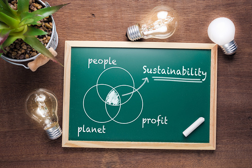That four- minute rebuke to world leaders by 15 year - old Swedish teenager Greta Thunberg stunned her audience and garnered international headlines. Mark Carney, former Bank of Canada and Bank of England Governor is among a growing chorus of the international governmental and financial elite who have decided to go beyond just “Talking the Talk” and “Walk the Talk” of making the planet sustainable for this future generation. He’s opted to forego seven-figure salary chair positions in global financial services for an “encore career” as U.N. special envoy on climate change and climate finance. He was the featured host speaker at the prestigious BBC Reith Lectures (www.bbc.co.uk/reithlectures) for 2020. I’ve provided the web site link to what is a series of four one- hour lectures. Take a listen. He brings a fascinating lucidity to the debate of how we must reconcile the fundamental values of society in the marketplace for goods and services with the critical need to embrace social and environmental sustainability as the driving force in a market economy. The fundamental problem according to Carney, and an increasing number of other economic and financial luminaries, is that we’ve become conditioned to believe that market driven financial metrics such as gross domestic product (GDP) are measures of the health and wealth in society. If the Dow Jones stock market index is on the rise that means an increase in dividends to shareholders and all is well. In short, we’ve shifted from market economy to a market driven society. What makes sense is what makes money. How that money is made is of secondary concern. Roger Martin, former Dean and now Professor Emeritus at University of Toronto’s elite Rotman School of Management has written a much acclaimed and reader friendly authoritative book with the ominous title, When More is Not Better[1]. He makes a convincing argument that the obsession with more growth and more profit in an unfettered market place for goods and services with a less government the better mantra isn’t contributing to long term sustainability. Nor is it making for a more affluent society as 90% of the wealth is now sequestered in 10% of the population, more often than not is offshore tax havens. Neither Mark Carney nor Roger Martin and their contemporaries, among them Bill Gates, can be in any way labelled as bleeding heart socialists. They’re adherents to and proponents of market- based economies. The fundamental problem is that economics has supplanted the moral and social principals that are the bulwarks of a sustainable society. The misappropriation of the architecture of a sustainable society by marketplace driven economic principles and practices has created a crisis that is threatening the existence of a global civilization. Does this sound histrionic? Not when you listen to what Mark Carney has to say in his four -part lecture series. The foundation for this renowned contemporary central banker’s source of knowledge is an interdisciplinary Ph.D. in economics, politics and philosophy. Yes, philosophy! The starting point for his study in economics was the writings of Adam Smith; a moral philosopher. Smith’s seminal The Wealth of Nations, the foundation for modern day economic theory, was intended to be a guide and not the driving force, for the application of the theory and principles of his substantive Theory of Moral Sentiments. An economic “Ides of March” is upon us. We need to undertake a dramatic shift from being a market driven society to being a morally focused society with sustainability of civilization as the driving force in a market - oriented economy. [1] Roger L. Martin, When More is Not Better, Overcoming America’s Obsession with Economic Efficiency. Boston. Harvard University Press (2020).
0 Comments
It’s time for governments to let go of the industrial economy model as the architecture and operational framework for society. The COVID19 pandemic crisis has demonstrated the inadequacy of government policies and programs that adhere to an obsession with supporting large corporations and offshoring, low taxes, minimum wages, and shell public services that are woefully under resourced and understaffed. Health is the new wealth and smart government is the new model for the design and delivery of programs in what is a new age service economy. The pandemic has exposed the flaws in relying on the off shoring for the production of health supplies, equipment and vaccines. Canada, is ranked as a developed country with the 9th largest global economy. However, it was relegated to an underdeveloped country status as it stood in line begging for everything from masks, medical equipment and vaccines from countries that had the foresight and smarts to create home- based health equipment, supplies and vaccines providers. Health must become recognized by governments as one of the fundamental pillars of strategic production and job creation in the country. The Global Public Health Intelligence Network (GPHIN) fiasco exposed how a federal governmental agency with global expertise was diminished to name only status with a skeleton workforce in conformance with the conventional public policy mantra of cost containment. In a globally connected community in which rampant disease transmission (remember SARS) and pandemics are now embedded as normal health risks, governmental agencies such as GPHIN aren’t costs. They’re investments. A GPHIN with the enviable best practices pandemic early warning capability it once had would have resulted in tens of billions of dollars of savings in pandemic management costs along with lives saved. The era of the rigid doctor nurse “closed shop” silo in the delivery of publicly funded health care and management is obsolete. Health is holistic. There are now 30 self-regulated health professions in Ontario. Health services are arguably the fastest growing sector in an aging economy. “New age” health services are job creators. Smart government at both the provincial and federal levels must cease treating public health care as a cost where the driving force is containment and embrace it as an investment with an acknowledgement that a healthy society is a wealthy society. Citizens of all ages with divergent capabilities can make meaningful contributions with holistic health support from the mix of “new age” para-professionals and professionals looking for burgeoning career opportunities. Public health care must be integrated into universal health care. But won’t universal health care bankrupt the government? Certainly not. COVID 19 has opened the door to the introduction of innovative approaches to health care access and services. Out of necessity people are becoming accustomed to using the phone and computerized intake forms as the initial point of online access to a health care practitioner or facility. This is the first step in what is labelled as “task encroachment” by high-tech. Artificial Intelligence (AI) has already developed nascent alternative health support systems (AHSP) that have the capability to accurately diagnose and prepare comprehensive holistic health care programs through direct online access by a prospective patient to the best qualified cost- effective practitioner. AI will eliminate first level costly inefficiencies, such as the mandatory visit to your doctor for what you and the doctor know will just be a referral, and enable health care para-professional and professionals to directly interface with patients cost effectively at the level where the most appropriate personalized expertise is needed. Yes, taxes will go up in this emergent health is wealth era. Smart government does mean more government, albeit government of a different kind with a “best practices” orientation. But what has rigid adherence to an out of date low cost/low taxes industrial model with shell public service agencies cost us as a society? |
John G. KellyMentoring & Counselling Archives
December 2023
Categories
All
|



 RSS Feed
RSS Feed
